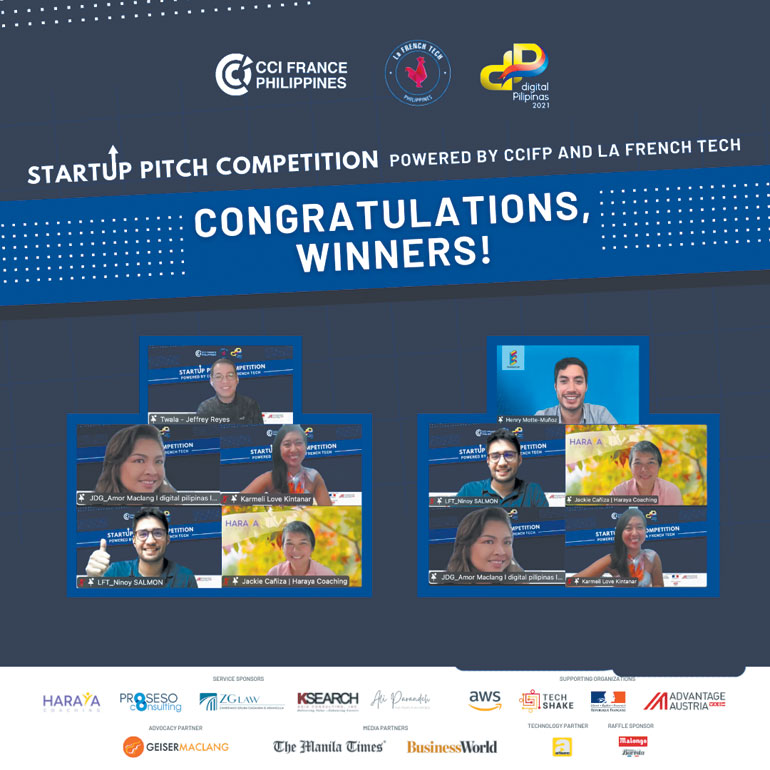
By Adrian Paul B. Conoza, Special Features Assistant Editor
A blockchain-powered e-signature solution and a leading education technology (edtech) platform won the very first Startup Pitch Competition virtually held by the French Chamber of Commerce and Industry in the Philippines (CCIFP) last Feb. 8.
Five Filipino startups and four with French equity joined the competition, which CCIFP held in partnership with La French Tech Philippines, a non-profit organization gathering French entrepreneurs and employees working in the tech industry in the Philippines; and Digital Pilipinas, a private sector-led movement for fostering a globally competitive technology and innovation ecosystem in the country.
In her opening remarks, Michèle Boccoz, ambassador of France to the Philippines, noted how the event provided an avenue for seizing and actualizing opportunities for Filipino and French tech companies in growing their businesses in the country. “This pitching contest is an illustration of the continuous action of the French Chamber to make the link between Philippine and French businesses,” Ms. Boccoz said.
The prizes for the winners consist of a P150,000 cash prize courtesy of CCIFP and the French Embassy, as well as accounting services worth P100,000; business coaching services worth P100,000; recruitment services worth P150,000; and legal services worth P150,000.
The winning Filipino startup in the competition is Twala (pronounced as tiwala, Filipino for trust), whose next-generation e-signature platform for signing, verifying, and storing digital contracts and documents aims to shorten long contract process — often hurdled by missing signatures — as well as avoid fraud due to fake documents.
“In Twala, we are making the contract process simpler, safer, and fast. Twala has reduced contract signing time from seven to 14 days to just two hours. We never have to worry about courier costs again as everything happens online. Twala empowers organizations to be 100% remote and hybrid work-compatible,” Jeffrey Reyes, chief executive officer (CEO) and co-founder of Twala, said during his pitch.
The first of its kind in the Philippines, Twala uses its own proprietary blockchain-anchored technology, which Mr. Reyes said makes their service 30%-50% more affordable than the competition. Also, Twala verifies the identities of signers by artificial intelligence-enabled identification and know-your-customer process.
Moreover, during the pitch, Mr. Reyes hinted at the other services Twala can provide beyond document signing. “With our blockchain technology, we can enable a lot of services online. Imagine logging in to a website, applying for a business permit or bank loan or even entering a building — all just by scanning a QR code,” he explained.
The CEO also shared that the prize money will be used to invest more in the security of its service. “We wanted to keep our promise of delivering a secure, legally binding and better document signing experience for our customers,” Mr. Reyes told BusinessWorld in an e-mail.
Winning the competition among startups with French equity is edtech platform Edukasyon.ph, which has plans to expand its revenue streams through an upcoming business-to-consumer (B2C) product.
Henry Motte-Muñoz, the company’s CEO and founder, reiterated in his pitch that in addressing the issue of Filipino students getting left behind from education to employment, Edukasyon.ph offers “comprehensive, localized, and scalable” solutions that help students assess (know what path to take), investigate (look at the options available), prepare by learning new skills, and commit by starting a career of their choice.
“It really takes the student from age 13 all the way into their first job,” Mr. Muñoz noted, adding that it has been creating educational content, learning modules, and campaigns with some of the biggest blue-chip names, from corporations, multinational institutions, to educational groups.
A more notable point from Mr. Muñoz’s pitch is Edukasyon.ph’s upcoming paid online tutoring product to support students, which he said is slated to be launched next quarter.
While its business-to-business streams have been profitable since the second half of 2021, Mr. Muñoz noted, this new product is expected to add “a nice B2C revenue” to their monetization strategy and, moreover, drive most of its revenue growth.
“As we continue to develop digital learning modules, educational campaigns, and customized edtech products for our growing Gen Z learner community, the prizes will allow us to broaden our investment in creating upskilling and guidance content for our users, to fortify our position as the number one edtech platform in the country,” Mr. Muñoz shared in a LinkedIn message.
In addition, Alaga Health won the Startup Choice Award after gaining the majority of the votes from over 450 attendees. The Filipino-owned startup received 2,000 euros-worth of mentorship sessions from startup mentor Ali Parandeh.
Pitched by its CEO Dr. Dexter Galban, Alaga Health, as a digital health social enterprise, aims to address key health challenges through technology, as well as be the country’s first health marketplace and service hub.
The panel of judges who screened the startup competitors were Amor Maclang, founding director of GeiserMaclang Marketing Communications, convenor of Digital Pilipinas, and member of CCIFP’s board of directors; Abe Lozada, general manager of Launchgarage; Carlo Delantar, founding partner of Core Capital; Frederic Levy, chief commercial officer of GCash; and RJ Balmater, investment associate at Monk’s Hill Ventures.



